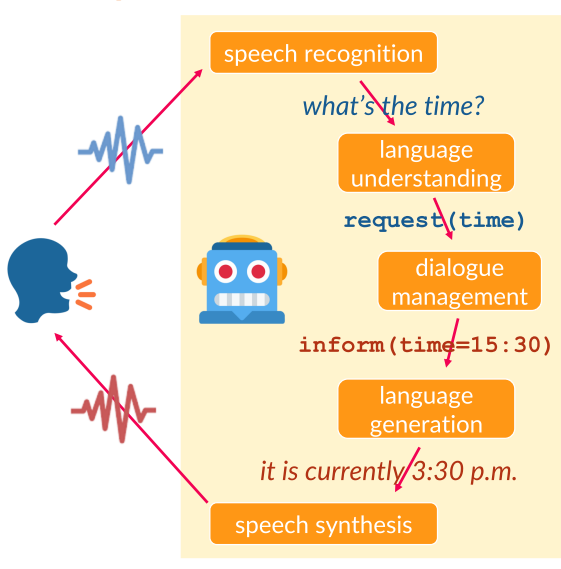This is an archived version of the 2019/2020 run of the course. See the current version here.
Dialogue Systems / Dialogové systémy
About
This course is a detailed introduction into the architecture of spoken dialogue systems, voice assistants and conversational systems (chatbots). We will introduce the main components of dialogue systems (speech recognition, language understanding, dialogue management, language generation and speech synthesis) and show alternative approaches to their implementation. The lab sessions will be dedicated to implementing a simple dialogue system or selected components.
Logistics
The course will be mostly in English, but we're happy to explain in Czech, too.
Lectures: Tue 9:00 S1 / Zoom
Labs: Tue 10:40 SU1 / Zoom
To pass this course, you will need to take an exam (written, covering important lecture content) and do lab homeworks (various dialogue system implementation tasks).

Topics covered
- Dialogue system types & formats (open/closed domain, task/chat-oriented)
- What happens in a dialogue (linguistic background)
-
Dialogue system components
- speech recognition
- language understanding, dialogue state tracking
- dialogue management
- language generation
- speech synthesis
- Dialogue authoring tools (IBM Watson Assistant/Google Assistant/Amazon Alexa)
- Voice assistants & question answering
- Chatbots
- Data for dialogue systems
- Dialogue systems evaluation
Lectures
PDFs with lecture slides:
- 1. Introduction (Feb 18)
- 2. What happens in a dialogue (Feb 25)
- 3. Data & evaluation (Mar 3)
- 4. Voice assistants & question answering (Mar 10)
- 5. Dialogue tooling (Mar 17)
- 6. Language understanding (non-neural) (Mar 24)
- 7. Neural language understanding & dialogue state tracking (Mar 31)
- 8. Dialogue policy (non-neural) (Apr 7)
- 9. Neural dialogue policies & natural language generation (Apr 14)
- 10. Text-to-speech synthesis (Apr 22)
- 11. Speech recognition by Petr Fousek & Pavel Květoň from IBM (Apr 27)
- 12. Chatbots (May 5)
Labs
Labs have a dedicated Gitlab repository with assignments. Please create a Gitlab account to participate in labs.
There's also a Slack workspace you can use to discuss assignments and get news about the course. Please contact us by email if you want to join and haven't got an invite yet.
Literature
Basic (good but very brief, available online):
- Jurafsky & Martin: Speech & Language processing. 3rd ed. draft (chapter 26).
Further reading:
-
Janarthanam: Hands-On Chatbots and Conversational UI Development. Packt 2017.
- practical guide on developing dialogue systems for current platforms, virtually no theory
-
Gao et al.: Neural Approaches to Conversational AI. arXiv:1809.08267
- an advanced, good overview of the latest neural approaches in dialogue systems
-
McTear et al.: The Conversational Interface: Talking to Smart Devices. Springer 2016.
- practical, for current platforms, more advanced and more theory than Janarthanam
-
Jokinen & McTear: Spoken dialogue systems. Morgan & Claypool 2010.
- good but slightly outdated, some systems very specific to particular research projects
-
Rieser & Lemon: Reinforcement learning for adaptive dialogue systems. Springer 2011.
- advanced, slightly outdated, project-specific
-
Lemon & Pietquin: Data-Driven Methods for Adaptive Spoken Dialogue Systems. Springer 2012.
- ditto
-
Skantze: Error Handling in Spoken Dialogue Systems. PhD Thesis 2007, Chap. 2.
- good introduction into dialogue systems in general, albeit slightly dated
-
McTear: Spoken Dialogue Technology. Springer 2004.
- good but dated
-
Psutka et al.: Mluvíme s počítačem česky. Academia 2006.
- virtually the only book in Czech, good for ASR but dated, not a lot about other parts of dialogue systems


